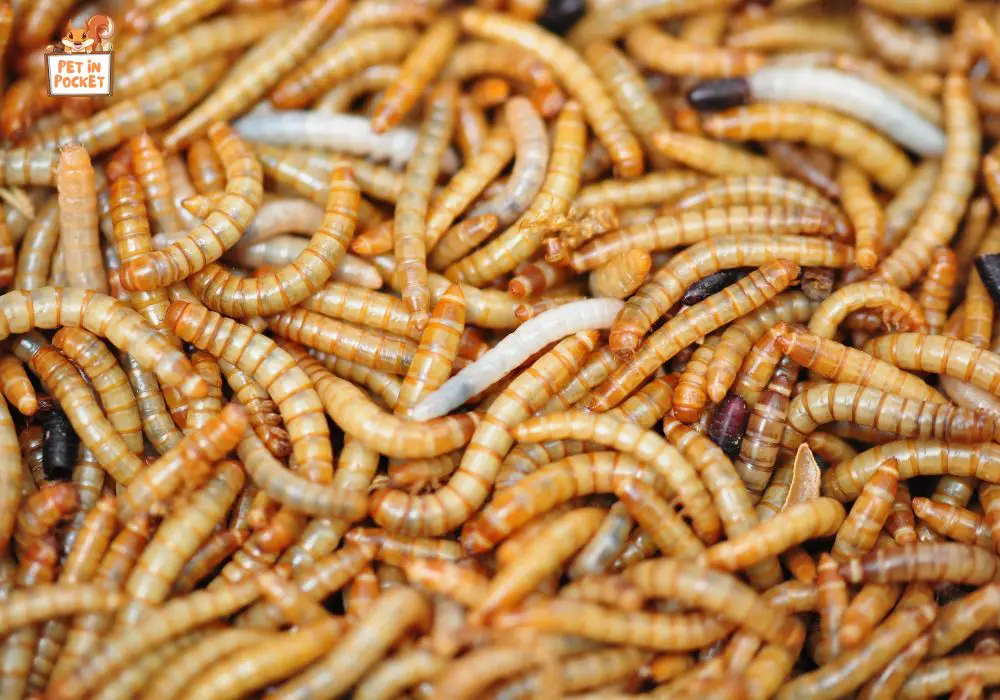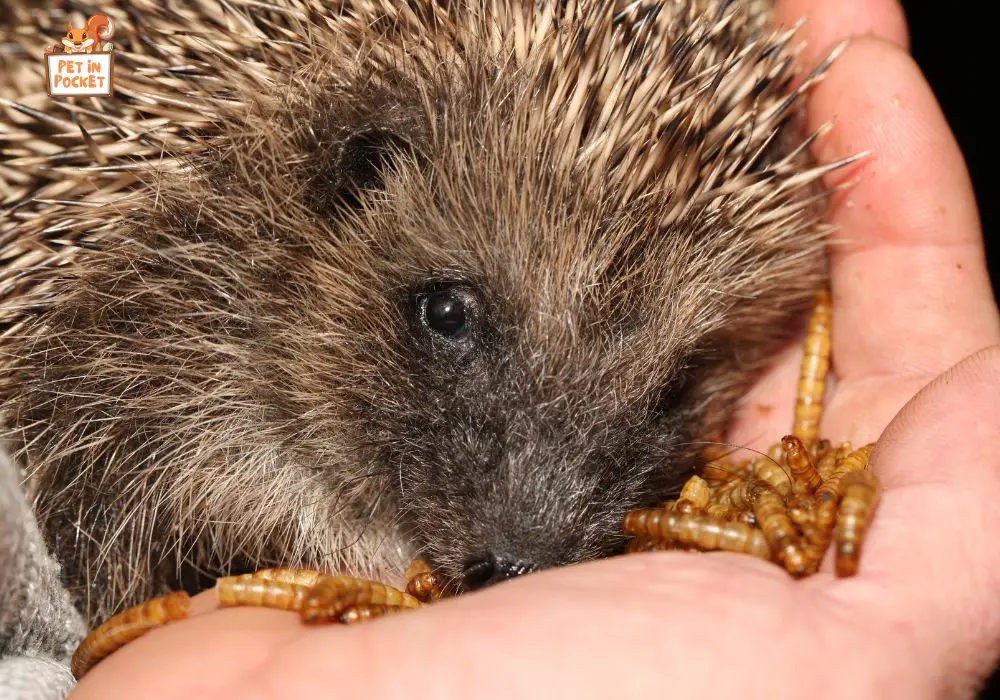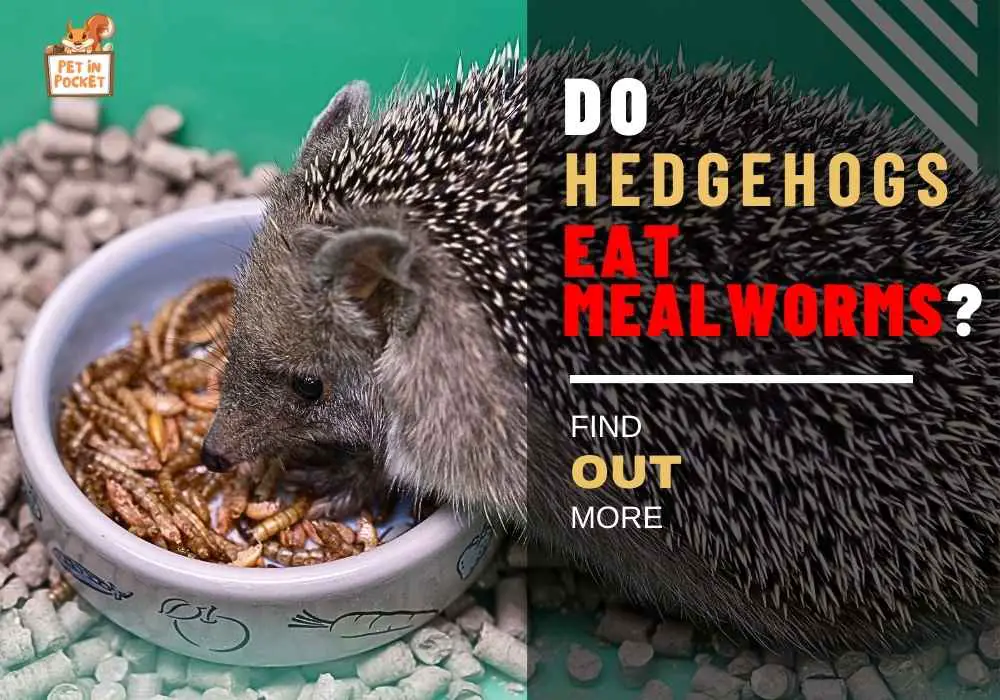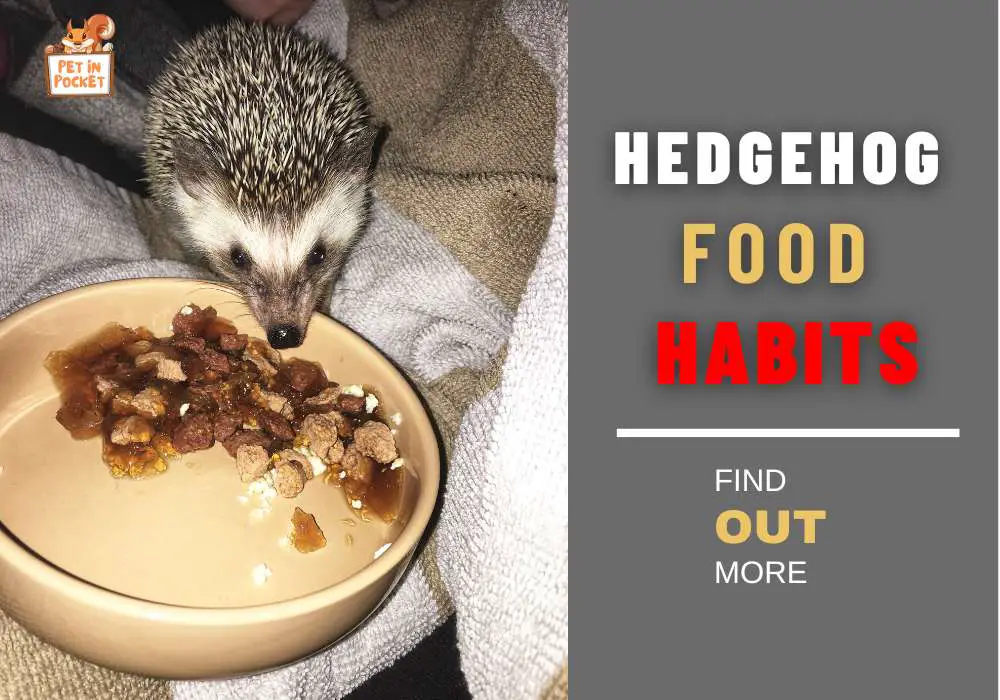Keepers often depend on a mealworm-based diet for their hedgies. But do hedgehogs eat mealworms? Most importantly, are these insects nutritious enough for our prickly pigs?
Hedgehogs thoroughly enjoy mealworms. Both captive and wild hedgies seem to get hooked on mealworms quickly. However, mealworms are only good as treats because of their low calcium and high phosphorus ratio. Feeding these worms as main meals can make the hedgies fall sick.
What health hazards are we talking about? What is an ideal diet for hedgehogs? Catch details below.
Table of Contents
Do Hedgehogs Eat Mealworms?
Hedgies love munching on mealworms. Once we left 3 to 4 live mealworms in the substrate to boost the hunting behavior of the hedgehogs. And within 10 minutes, our tiny quill ball devoured all the worms. So yes, hedgies absolutely enjoy the taste of mealworms.
Besides, mealworms have a decent nutritional profile (protein 52.35% and fat 24.70%). It fits the ideal hedgehog diet requirement: 30 – 50% protein and 10 to 20% fat.
Still, we do not advise stuffing the hedgies with mealworms because of the calcium and phosphorus ratio. Ideally, any meal with 1:1 and 2:1 Ca:P is good for the prickly pigs. However, in mealworms, the ratio varies from 1:2 to 1:3, which can be alarming for hedgehogs.
Benefits of Mealworms for Hedgehogs

The controversy circling around mealworms for hedgehogs is real. We will discuss the downsides of this worm later. First, let’s see how exactly mealworms can benefit our hedgies.
1. Nutritional Value
Mealworms are rich in protein, fat, and amino acids. A diet supplemented with mealworms can prevent protein deficiency in hedgies. Such meals also help in their muscle growth and boost their energy level.
2. Hydration
Live mealworms contain a minimal water content. Preying on those worms can help the hedgehogs prevent dehydration in harsh conditions.
3. Taste Variety
Hedgies look for variety in their meals. The same food every day can bore their taste buds. Adding mealworms occasionally solves this issue. Hedgehogs enjoy the variety, and it promotes their appetite even more.
Health Risks of Mealworms for Hedgehogs
Just as mentioned, mealworms do have some darker sides. Feeding hedgehogs a mealworm-based diet might backfire completely. The cons are:
1. Addiction to Mealworms
Yes, it’s true. Hedgehogs can get addicted to mealworms. In fact, sometimes the quill balls get so hooked up that they refuse to eat anything else.
2. Obesity
The safe fat limit for hedgehogs is 10 to 20%. However, the fat content in mealworms is slightly higher than this threshold. As a result, there is a risk of obesity in hedgies.
Fattening can cause other health issues in the quill balls. They will suffer from kidney issues, liver damage, and organ failure because of obesity in the long run.
3. Gastrointestinal Issue
Exoskeleton insects like mealworms have a hard shell called chitin on them. Hedgehogs find it difficult to process and digest that chitin. Thus, consuming too many mealworms causes constipation, impaction, and other digestion-related issues.
4. Metabolic Bone Disease
Hedgies on a mealworm-based diet fall victim to MBD or metabolic bone disease. As the calcium percentage in mealworms is insignificant, hedgies are at risk of calcium deficiency. Their body detects this problem beforehand and starts stripping bone calcium for survival. Therefore, hedgehogs suffer from weak bones, and they are now more prone to fractures.
Signs of metabolic bone disease in hedgehogs are,
- Broken bones and teeth
- Lethargy
- Trouble walking
- Limping
- Overgrown jaw
- Abnormal bone or spinal growth, etc.
Can Hedgehogs Eat Dried Mealworms?

Hedgehogs will eat dried mealworms without any complaints. But our prickly pigs prefer live worms as they get the taste of hunting.
Many owners offer the hedgies wild caught mealworms. Do not make this mistake. The wild mealworms can carry diseases and parasites. Hence, the store-bought live mealworms are always preferable.
We know buying live mealworms regularly can be a hassle. That’s why we refrigerate the worms after bringing them from the store. It prolongs the larvae stage of the mealworms without ruining their taste.
How Many Mealworms Should A Hedgehog Eat A Day?
Honestly, there is no straightforward answer to this question. From our experience, we recommend feeding 1 or 2 mealworms to the hedgehogs every day. Offering them more mealworms will only push them towards long term diseases.
Our advice is to consider mealworms as treats, not as a staple diet. You better add other insects, worms, vegetables, and fruits with mealworms. That way, hedgehogs can avoid the negative effects of mealworms and get benefitted from them.
What Do Hedgehogs Eat?
Hedgehogs are insectivores, meaning they live on worms and insects. But we said that depending on only one kind of worm can be dangerous for hedgies.
We advise you to add two or three types of worms and insects to their meals. Favorite insects and worms of our quill balls are: waxworm, hornworm, Dubia roaches, pinkie mice, snail, beetle, grasshopper, etc.
Anyway, a complete animal-protein-based diet is not ideal for hedgehogs. You need to add vegetables (romaine lettuce, escarole, leafy greens, etc) and fruits (berries, bananas, apples, etc.) to the meals. These balance out the diet, offer mineral backup and bring variety to the meal.
Conclusion
Hedgehogs love the gooey taste and texture of mealworms. The prickly pigs often get hooked to the mealworms.
However, feeding the hedgies only mealworms can be hazardous as those worms are high in phosphorus and low in calcium. Hedgehogs can suffer from obesity, metabolic bone disease, and indigestion due to these worms.
Therefore, only offer your hedgehogs mealworms in moderation. Feed them mealworms only as treats. Always add a variety of worms, insects, vegetables, and fruits other than mealworms to the hedgie’s diet.
FAQs
Are mealworms harmful to hedgehogs?
The high phosphorus in mealworms draws calcium from the bone to balance calcium deficiency. This weakens the bone and skeleton structure of the hedgehogs. The pets suffer from metabolic bone disease, fracture, splaying, limping etc.
What food is best for a hedgehog?
A meal consisting of insects, worms, vegetables, and fruits is ideal for hedgehogs. As they are insectivores, the bowl mainly includes mealworms, beetles, waxworms, etc. 2 to 3 tablespoons of insects are healthy for them. You should add 1 tablespoon of fruits and vegetables to balance out the meal.
Can hedgehogs eat rice?
Hedgehogs can eat rice, and they seem to enjoy it. But remember, rice is rich in carbohydrates and has no nutritional value for hedges. Overfeeding rice can cause obesity, mineral deficiency, and indigestion in pets.
Can you overfeed a hedgehog?
Overfeeding the hedgehogs is a common problem. Owners often miscalculate the quantity of the meal and select wrong food items. Ideally, gut-loaded worms and insects are good for hedgies. Offer them 2-3 tablespoons of protein and 1 tablespoon of fruits and vegetables to avoid overfeeding.
Can hedgehogs drink milk?
Hedgehogs are lactose intolerant. Hence, offering them milk will cause diarrhea, vomiting, and indigestion. The only liquid hedgies require is water. Even fruit juice is considered unhealthy for them.






Leave a Reply